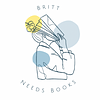Take a photo of a barcode or cover

brittneedsbooks 's review for:
The Bookbinder
by Pip Williams
Pip Williams takes readers on a poignant journey through history and the lives of two resilient women in her novel, The Bookbinder. Set against the backdrop of World War I, Williams skillfully explores themes of knowledge, empowerment, and the impact of war on individuals and society.
The story revolves around twin sisters, Peggy and Maude, who work in the bindery at Oxford University press during a time when men are being sent off to war. Peggy, ambitious and intelligent, dreams of a different future where she can expand her horizons beyond the bindery's confines. Meanwhile, Maude finds solace and purpose in the meticulous work of folding pages. Their lives are forever altered when refugees from war-torn Belgium arrive, bringing with them new perspectives and challenges.
Williams' prose is evocative and immersive, effectively transporting readers to early 20th-century Oxford. The historical setting is meticulously researched and vividly portrayed, capturing the atmosphere of the time and the struggles faced by women in their pursuit of education and independence. The author's attention to detail shines through in her descriptions of bookbinding processes, creating a sense of craftsmanship and reverence for the art.
The characters, especially Peggy and Maude, are complex and well-developed, offering contrasting perspectives on the role of women in society. Peggy's desire for knowledge and intellectual growth resonates with readers, highlighting the inequalities and limitations faced by women during that era. Maude, on the other hand, finds fulfillment and contentment within the confines of her work, representing a different path to personal satisfaction. Their relationship as sisters is beautifully depicted, with Peggy's protective nature towards Maude adding emotional depth to the story.
The exploration of the power of knowledge and access to education is a central theme in The Bookbinder. Williams raises thought-provoking questions about who gets to create knowledge and who is privileged enough to access it. Through Peggy's aspirations and encounters with the refugees, the novel delves into the transformative nature of education and its potential to shape lives and challenge societal norms.
The pacing of the novel is steady, allowing the narrative to unfold gradually while maintaining a sense of intrigue. However, there are moments when the plot feels slightly predictable, particularly regarding Peggy's romantic involvement with a Belgian soldier. Nevertheless, the emotional depth and the exploration of broader social issues compensate for any predictability.
In summary, The Bookbinder is a beautifully written historical novel that transports readers to a bygone era. With its compelling characters, meticulous attention to detail, and exploration of important themes, Pip Williams once again demonstrates her ability to shed light on hidden histories through the eyes of strong and resilient women.
The story revolves around twin sisters, Peggy and Maude, who work in the bindery at Oxford University press during a time when men are being sent off to war. Peggy, ambitious and intelligent, dreams of a different future where she can expand her horizons beyond the bindery's confines. Meanwhile, Maude finds solace and purpose in the meticulous work of folding pages. Their lives are forever altered when refugees from war-torn Belgium arrive, bringing with them new perspectives and challenges.
Williams' prose is evocative and immersive, effectively transporting readers to early 20th-century Oxford. The historical setting is meticulously researched and vividly portrayed, capturing the atmosphere of the time and the struggles faced by women in their pursuit of education and independence. The author's attention to detail shines through in her descriptions of bookbinding processes, creating a sense of craftsmanship and reverence for the art.
The characters, especially Peggy and Maude, are complex and well-developed, offering contrasting perspectives on the role of women in society. Peggy's desire for knowledge and intellectual growth resonates with readers, highlighting the inequalities and limitations faced by women during that era. Maude, on the other hand, finds fulfillment and contentment within the confines of her work, representing a different path to personal satisfaction. Their relationship as sisters is beautifully depicted, with Peggy's protective nature towards Maude adding emotional depth to the story.
The exploration of the power of knowledge and access to education is a central theme in The Bookbinder. Williams raises thought-provoking questions about who gets to create knowledge and who is privileged enough to access it. Through Peggy's aspirations and encounters with the refugees, the novel delves into the transformative nature of education and its potential to shape lives and challenge societal norms.
The pacing of the novel is steady, allowing the narrative to unfold gradually while maintaining a sense of intrigue. However, there are moments when the plot feels slightly predictable, particularly regarding Peggy's romantic involvement with a Belgian soldier. Nevertheless, the emotional depth and the exploration of broader social issues compensate for any predictability.
In summary, The Bookbinder is a beautifully written historical novel that transports readers to a bygone era. With its compelling characters, meticulous attention to detail, and exploration of important themes, Pip Williams once again demonstrates her ability to shed light on hidden histories through the eyes of strong and resilient women.